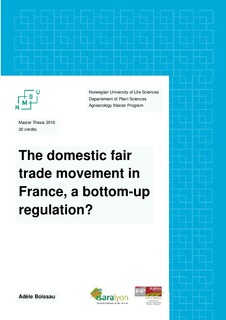The domestic fair trade movement in France, a bottom-up regulation?
Master thesis
Permanent lenke
http://hdl.handle.net/11250/2381681Utgivelsesdato
2016-03-07Metadata
Vis full innførselSamlinger
- Master's theses (IPV) [240]
Sammendrag
Over the last two decades, alternative food systems have been developing quickly. Recently, the convergence between the fair trade sector and the growing demand for local products, has participated to the development of a new movement called domestic fair trade. Such initiatives have emerged within countries from the global North, but also from the global South. In Europe, the French DFT network seems to have grown and organized rapidly compared to the neighbored countries. Thanks to participatory observation, numerous interviews and document analysis, this study aims to assess the situation of the French DFT network, and especially its regulation. The results underline the complexity of the web of stakeholders. They show that there are three long supply chains DFT projects in France led by the retailers Biocoop, Bio Partenaire and Ethiquable. The study shows the Fair Trade Plateform (PFCE) has taken the leadership in organizing the movement at a national level, and is playing a key role by making the link between farmers and retailers on one part, and the French State on the other part. This work confirms the assumption that regulation of DFT initiatives’ practices can be considered as a bottom-up construction since the historically developed DFT initiatives appeared several years before the DFT movement was recognized by the government in 2014.

